HOMEGROWN NATIONAL PARK
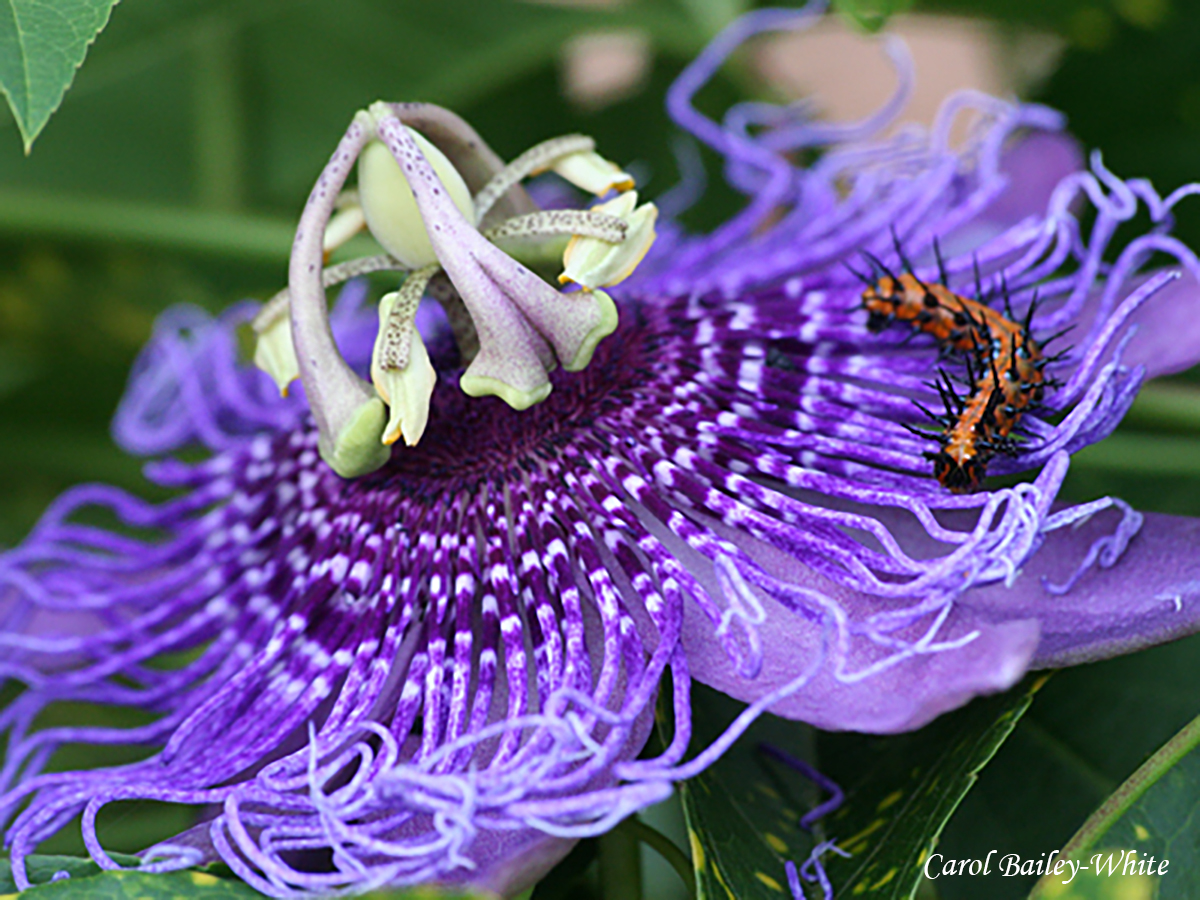 By now most of us have heard about the “insect apocalypse,” an alarming decline in insect populations around the world. Scientists point to multiple causes, including climate change, habitat loss, the use of toxic pesticides, and the proliferation of non-native plants in our landscape. By now most of us have heard about the “insect apocalypse,” an alarming decline in insect populations around the world. Scientists point to multiple causes, including climate change, habitat loss, the use of toxic pesticides, and the proliferation of non-native plants in our landscape.
Why should we care? In a study published in 2019 by the journal Science, the North American continent has lost over 3 billion birds since 1970, a loss of nearly 30% of the total bird population. One of the factors contributing to this decline is the reduction in overall insect biodiversity. Many bird species rely on insect protein to feed their growing nestlings, and with less insects available, fewer birds are surviving to adulthood.
And the insect apocalypse will affect people as well, as insects are a major pollinator of food crops. They also aerate the soil our food is grown in and assist in the decomposition of organic matter and soil enrichment. Many insects also provide pest control services by preying on harmful bugs that can damage crops as well as home gardens.
 Clearly, this reduction in insect biodiversity has ominous implications for the future of life on our planet. That’s why Professor Doug Tallamy of the University of Delaware has made it his mission to create a “Homegrown National Park” by encouraging home gardeners to regenerate biodiversity by planting native plants and removing invasive plants in their home landscape. Even planting just a few native plants in your yard can support pollinators and provide important food sources for native birds raising their young. You can find out what native plants are beneficial for birds in your area with Audubon's Plants For Birds online database. Clearly, this reduction in insect biodiversity has ominous implications for the future of life on our planet. That’s why Professor Doug Tallamy of the University of Delaware has made it his mission to create a “Homegrown National Park” by encouraging home gardeners to regenerate biodiversity by planting native plants and removing invasive plants in their home landscape. Even planting just a few native plants in your yard can support pollinators and provide important food sources for native birds raising their young. You can find out what native plants are beneficial for birds in your area with Audubon's Plants For Birds online database.
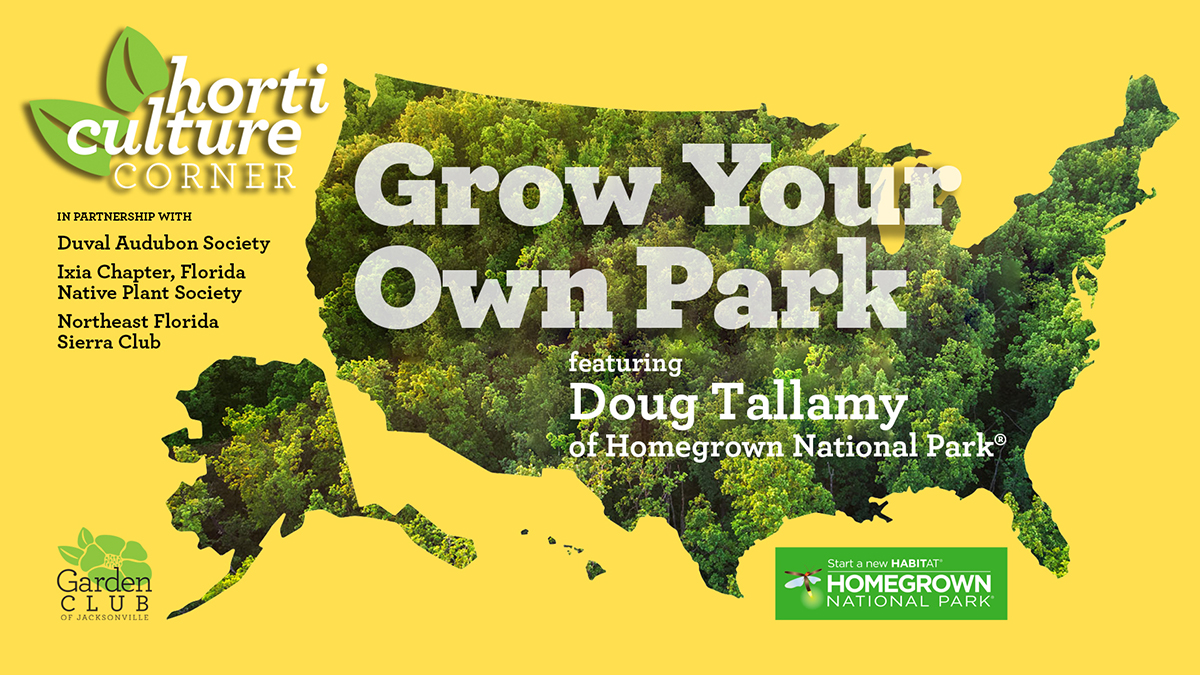 We are thrilled to partner with the Ixia Chapter of the Florida Native Plant Society, Sierra Club Northeast Florida, and the Garden Club of Jacksonville to present a special “Grow Your Own Park” program to encourage Northeast Florida gardeners to plant natives in their landscape and sign up their yards for the Homegrown National Park challenge. Dr. Tallamy will join us via Zoom to talk about the Homegrown National Park project, followed by an in-person introduction to easy-to-grow native plants. A selection of native plants will be available for sale at the event as well as books on native plant gardening, plus lots of free information to help you go native and grow your own park. We are thrilled to partner with the Ixia Chapter of the Florida Native Plant Society, Sierra Club Northeast Florida, and the Garden Club of Jacksonville to present a special “Grow Your Own Park” program to encourage Northeast Florida gardeners to plant natives in their landscape and sign up their yards for the Homegrown National Park challenge. Dr. Tallamy will join us via Zoom to talk about the Homegrown National Park project, followed by an in-person introduction to easy-to-grow native plants. A selection of native plants will be available for sale at the event as well as books on native plant gardening, plus lots of free information to help you go native and grow your own park.
Please join us at 5:30 pm on Thursday, March 3, 2022, at The Garden Club of Jacksonville for this exciting event! This program is free, but advance registration is required in order to attend. We look forward to seeing you there!
GREAT BACKYARD BIRD COUNT
The Great Backyard Bird Count (GBBC) is an annual four-day event that engages bird watchers of all ages and skill levels in counting birds to create a real-time snapshot of bird populations. Participants are asked to count birds for as little as 15 minutes (or as long as they wish) on one or more days of the event and report their sightings online.
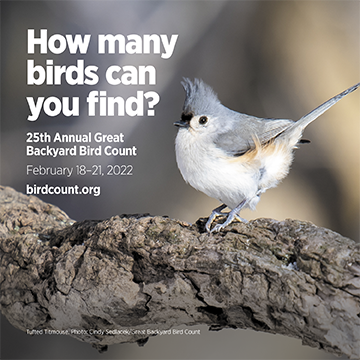 Sponsored by the Cornell Lab of Ornithology, the National Audubon Society, and Birds Canada, the GBBC has become a worldwide phenomenon, with estimates of more than 300,000 bird watchers around the world participating last year and contributing close to 380,000 bird observations. These observations help scientists better understand global bird populations and movements, and lay the groundwork for effective strategies to protect them and the environments they (and we!) rely on for survival. Sponsored by the Cornell Lab of Ornithology, the National Audubon Society, and Birds Canada, the GBBC has become a worldwide phenomenon, with estimates of more than 300,000 bird watchers around the world participating last year and contributing close to 380,000 bird observations. These observations help scientists better understand global bird populations and movements, and lay the groundwork for effective strategies to protect them and the environments they (and we!) rely on for survival.
This year’s GBBC runs from Friday, February 18 through Monday, February 21, and you can participate by simply watching birds in your backyard or at your favorite nature getaway. If you already have an eBird account, simply submit your sightings as you normally do, and they will automatically be included in the GBBC data. If you’re new to birding, download the Merlin Bird ID app to your phone and use it to help you identify the birds you see, then submit your sightings on the app (here’s how!)
The GBBC website has lots more information about how to participate in the count, whether you are a novice birdwatcher or an expert (or somewhere in between!) They are also hosting a GBBC Webinar at 2 pm (EST) on Wednesday, February 16, so please join the webinar to brush up on bird ID, unlock the mystery of bird songs, and practice counting birds no matter how large the flock or how busy the feeder. The webinar is free, but you will need to register to participate.
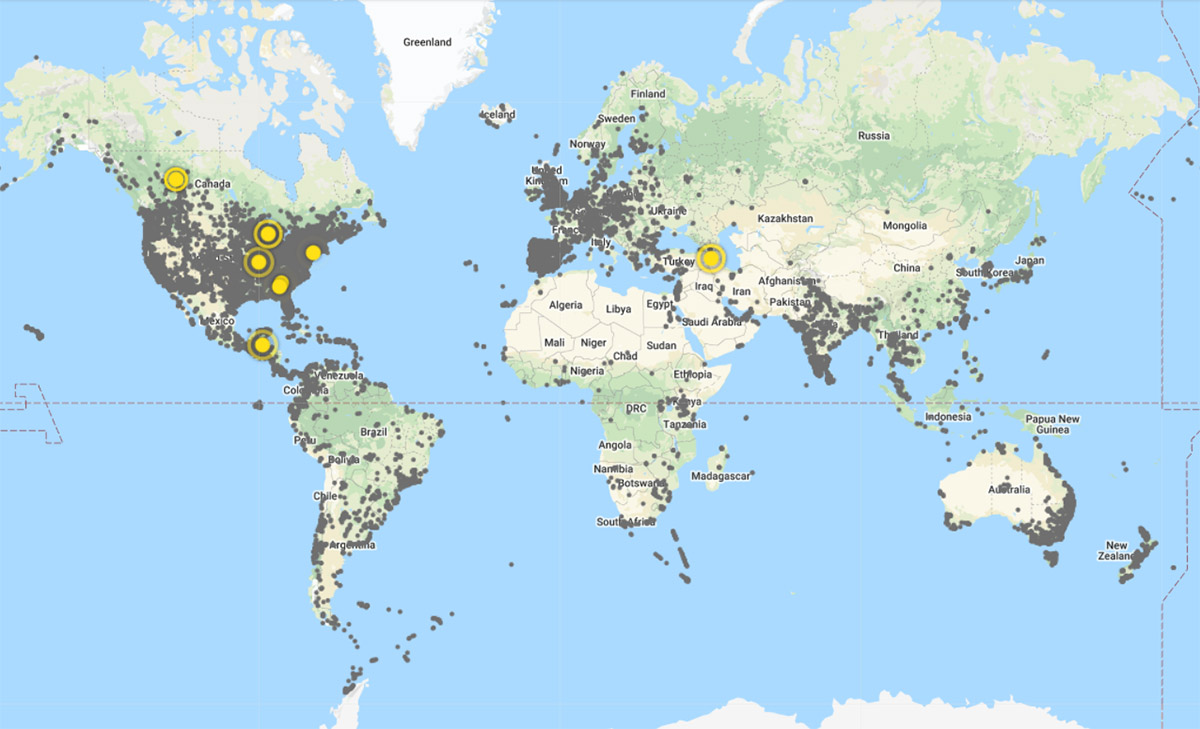 Another fun feature of the GBBC website is the bird observations map, where you can watch as bird observation checklists are submitted from all around the world, in real time! The map is up and running right now, but it’s especially fun to watch the checklists coming in fast and furious during the four days of the GBBC. Another fun feature of the GBBC website is the bird observations map, where you can watch as bird observation checklists are submitted from all around the world, in real time! The map is up and running right now, but it’s especially fun to watch the checklists coming in fast and furious during the four days of the GBBC.
Finally, consider joining us at 8 am on February 19 at our Crosby Sanctuary conservation property in Orange Park for our Nature Walk and Volunteer Workday. Sanctuary director Pete Johnson will lead the nature walk and submit our GBBC group checklist from the walk. Even if you can’t stay for the workday, you are welcome to join us for the nature walk. We do ask that you register in advance on our Meetup site so we know how many to expect.
Wherever you are that weekend, we hope you will join the fun and participate in the 25th Annual Great Backyard Bird Count!
LIGHTS OUT NORTHEAST FLORIDA CALL FOR VOLUNTEERS
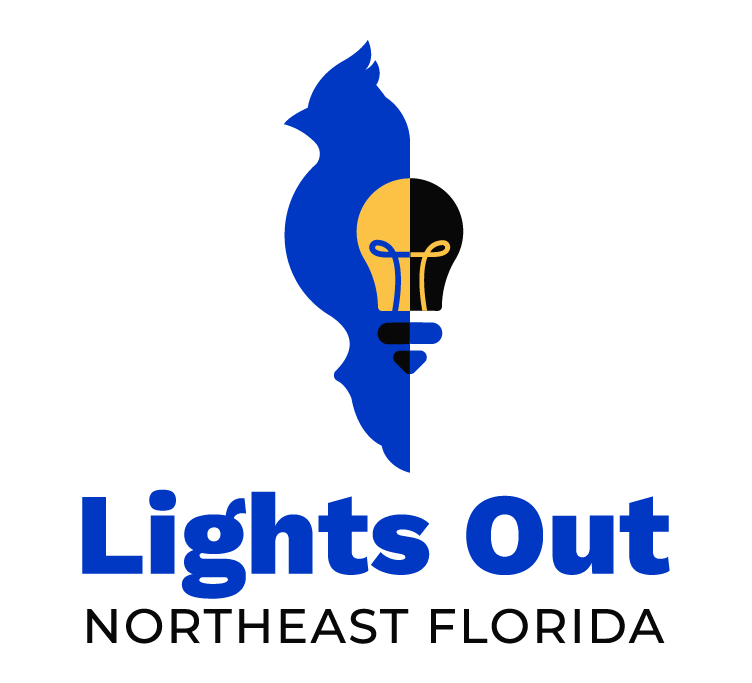 Our Lights Out Northeast Florida (LONF) initiative in partnership with the St. Johns County Audubon Society and the Jacksonville Zoo and Gardens has just completed its first full year of data collection. During the spring and fall 2021 migration seasons, volunteers walked established routes in downtown Jacksonville to find birds that were killed or injured by window strikes. The data they collected about the dangers that bright nighttime lighting can pose to migrating birds will be shared with downtown building owners and managers, who will be asked to sign our pledge to reduce nighttime lighting on their buildings during migration season. Our Lights Out Northeast Florida (LONF) initiative in partnership with the St. Johns County Audubon Society and the Jacksonville Zoo and Gardens has just completed its first full year of data collection. During the spring and fall 2021 migration seasons, volunteers walked established routes in downtown Jacksonville to find birds that were killed or injured by window strikes. The data they collected about the dangers that bright nighttime lighting can pose to migrating birds will be shared with downtown building owners and managers, who will be asked to sign our pledge to reduce nighttime lighting on their buildings during migration season.
The volunteer-driven data collection effort continues this year to provide the LONF project with comparative data from multiple years to assess whether our efforts to encourage building managers in downtown Jacksonville to turn off lights at night have indeed resulted in fewer migrating birds killed or injured by window strikes.
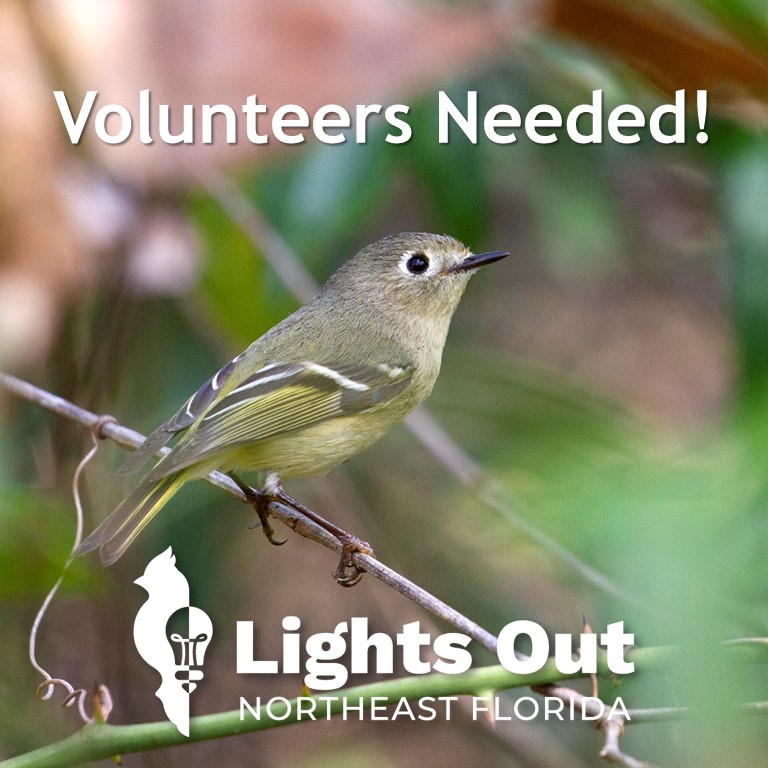 We are currently accepting applications for volunteers for the upcoming spring migration season starting March 15. LONF volunteers commit to one route, one day a week for eight weeks, starting about dawn, and each route takes roughly an hour to an hour and a half to complete. Volunteers DO NOT need to know what kind of bird they are finding – this can be figured out later. We will try to pair new volunteers with experienced ones who can provide on-site training, but we will also have virtual training videos available for all new volunteers. All supplies (except a cell phone) will be provided. We are currently accepting applications for volunteers for the upcoming spring migration season starting March 15. LONF volunteers commit to one route, one day a week for eight weeks, starting about dawn, and each route takes roughly an hour to an hour and a half to complete. Volunteers DO NOT need to know what kind of bird they are finding – this can be figured out later. We will try to pair new volunteers with experienced ones who can provide on-site training, but we will also have virtual training videos available for all new volunteers. All supplies (except a cell phone) will be provided.
You can learn more about the Lights Out Northeast Florida initiative here.
If you are interested in helping us save the lives of migrating birds, please complete our online application, and we'll be in touch soon.
CALL FOR NEWSLETTER CONTRIBUTORS
Have you had an exciting birding adventure you’d like to share? Or maybe some helpful tips for bird ID? How about some birding or nature-related artwork, or a review of a great book you’ve read recently? We’re looking for volunteer contributors to our monthly Audubon Observer newsletter, so if you’d like your article or creative work to be featured in one of our upcoming newsletters, here’s what we’re looking for:
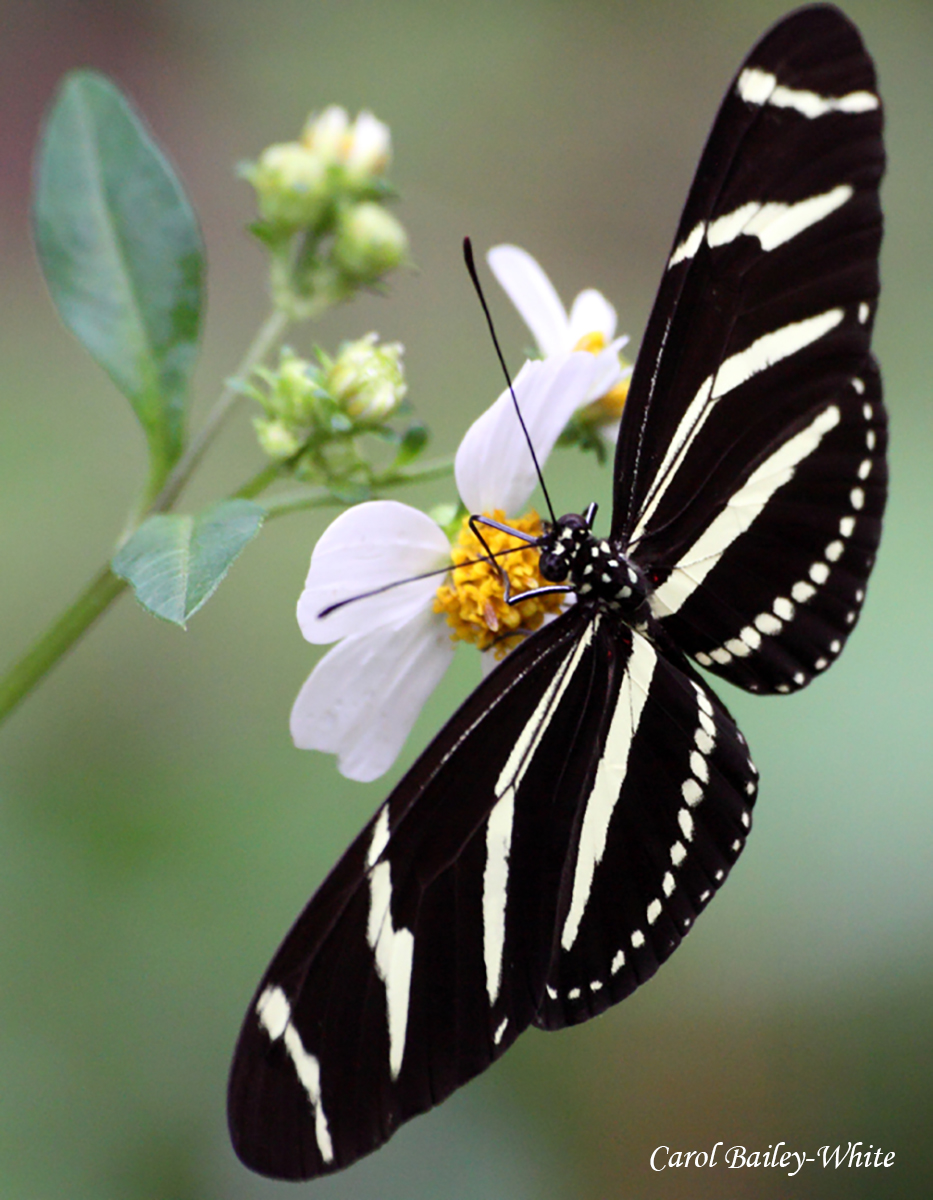 Articles should be brief (500 words or less) and of general interest to our subscribers. Articles should be brief (500 words or less) and of general interest to our subscribers.- Ideally it will be something upbeat and informative - a bird-related book review, a local species profile, native plants, birding tips, bird photography tips, a brief rundown on a local project benefiting birds, or your own creative idea for something our subscribers might want to read about.
- Content promoting commercial or business enterprises will not be accepted.
- The editor reserves the right to revise contributed content as needed.
If you would like to contribute to our newsletter (which goes out to more than 2,000 subscribers every month!), please submit your content to us at duvalaudubon@gmail.com no later than the 20th of each month for publication the following month.
Questions? Please feel free to contact us. Thank you!
UPCOMING ACTIVITIES
Here's what's happening this month:
- Field Trip @ Kathryn Abbey Hanna Park ($5 per vehicle): 8-11 am, Saturday, February 5, 2022 (register here).
- Birding 101 @ Sheffield Regional Park (no fee): 8-11 am, Sunday, February 6, 2022 (register here).
- Field Trip @Theodore Roosevelt Area (no fee): 8-11 am, Saturday, February 12, 2022 (register here).
- Great Backyard Bird Count: February 18-21, 2022 (more info here).
- Nature Walk & Work Day @ Crosby Sanctuary: 8 am - 12 pm, Saturday, February 19, 2022 (register here).
- "Getting to Know Shorebirds" Virtual Monthly Program: 6:30-8:30 pm, Monday, February 21, 2022 (register here).
- Open House @ Crosby Sanctuary: 8 am - 12 pm, Saturday, February 26, 2022 (no registration needed).
We look forward to seeing you soon!
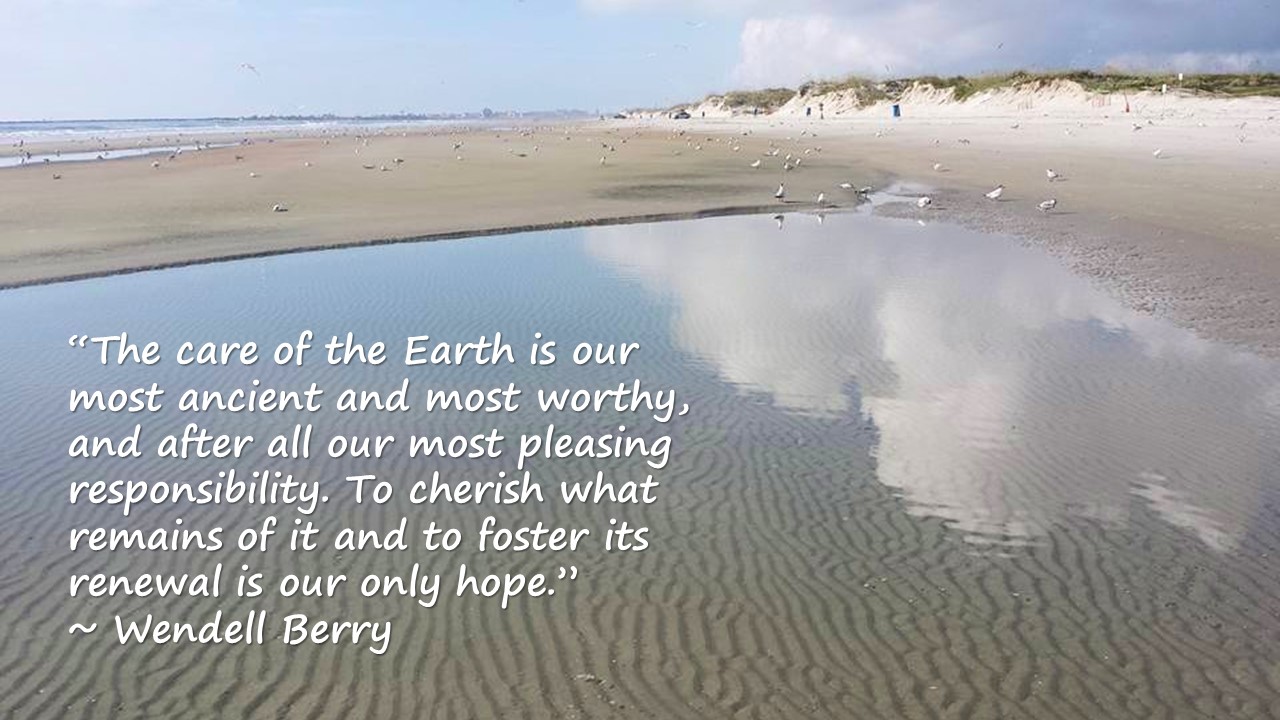
All content by Carol Bailey-White unless otherwise noted.
Duval Audubon Society, Inc.
P.O. Box 16304
Jacksonville, FL 32245
www.duvalaudubon.org
    
|
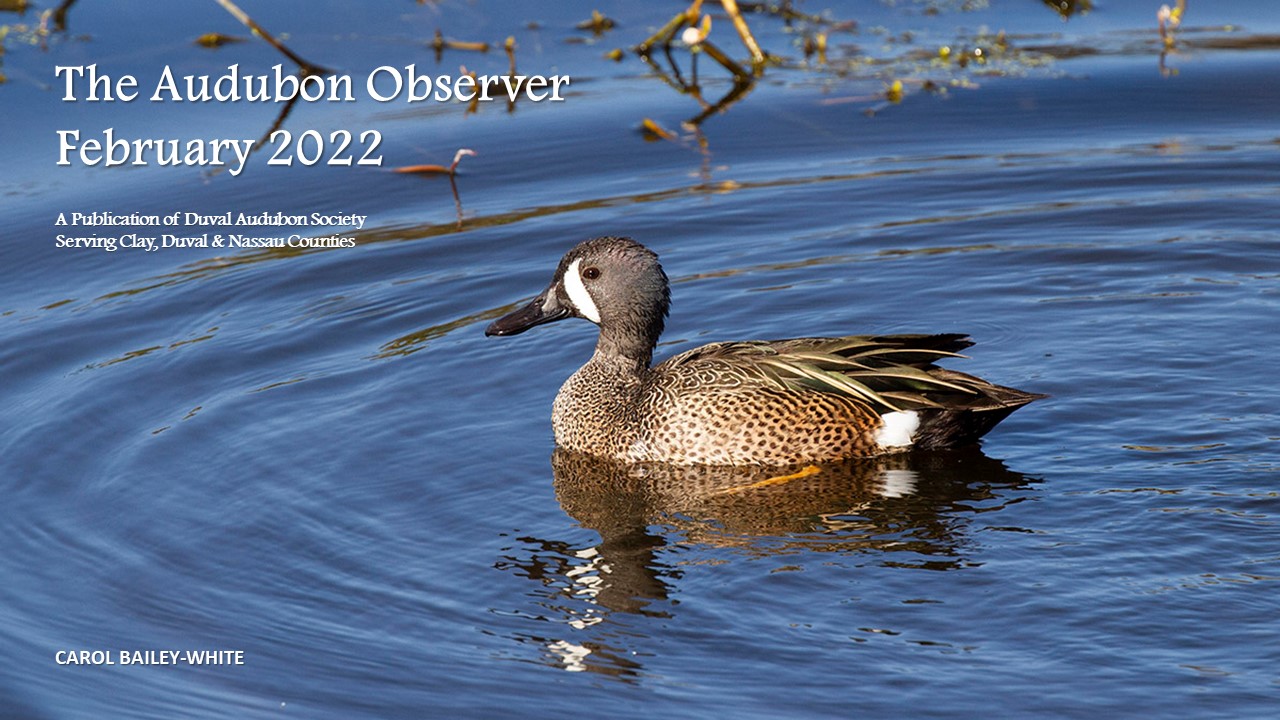
 By now most of us have heard about the “
By now most of us have heard about the “


 Another fun feature of the GBBC website is the
Another fun feature of the GBBC website is the 

 Articles should be brief (500 words or less) and of general interest to our subscribers.
Articles should be brief (500 words or less) and of general interest to our subscribers.